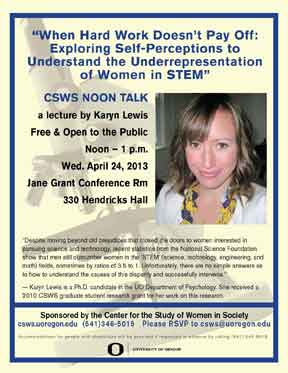 330 Hendricks
Jane Grant Rm
1408 University
UO campus
330 Hendricks
Jane Grant Rm
1408 University
UO campus
“When Hard Work Doesn’t Pay Off: Exploring Self-Perceptions to Understand the Underrepresentation of Women in STEM”
Karyn Lewis is a Ph.D. candidate in the UO Department of Psychology. She received a 2010 CSWS graduate student research grant for her work on this research.From the 2012 CSWS Annual Review
“Despite moving beyond old prejudices that closed the doors to women interested in pursuing science and technology, recent statistics from the National Science Foundation show that men still outnumber women in the “STEM” (science, technology, engineering, and math) fields, sometimes by ratios of 3.5 to 1. Unfortunately, there are no simple answers as to how to understand the causes of this disparity and successfully intervene. As social psychologists, we can use our training to understand how the social context of these traditionally male-dominated fields might affect the participation and persistence of women. Past work by other social psychologists has primarily examined contextual factors that affect women’s objectively measured performance. For instance, the seminal research by Claude Steele and his colleagues on stereotype threat has shown that even seemingly small things, like marking one’s gender on a standardized test prior to taking the test or being the only female present in a classroom are enough to cause a cascade of internal events, such as worrying about confirming negative stereotypes, that in turn can eat up precious cognitive capacity and in the end undermine women’s performance.“This past work greatly enhanced our understanding about influences on women’s performance in STEM. However, we know that it isn’t performance alone that predicts persistence in STEM fields. In fact, the subjective perception of how one is doing in a field (which doesn’t necessarily correlate with actual performance), over and above objective performance, can also predict motivation and persistence in that field. My work, done in collaboration with my graduate advisor, Dr. Sara Hodges, has been focused on understanding what situational factors affect women’s self-perceptions and how these self-perceptions in turn affect decisions to persist in STEM.”—Karyn Lewis

